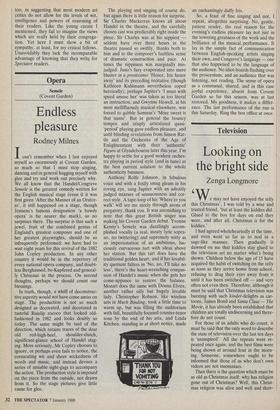Opera
Semele (Covent Garden)
Endless pleasure
Rodney Milnes
I can't remember when I last enjoyed myself so enormously at Covent Garden, so much so that I must stop singing, dancing and in general hugging myself with glee and try and work out precisely why. We all know that the Handel/Congreve Semele is the greatest comedy written for the English musical stage (even if it was first given 'After the Manner of an Orator- io', it still happened on a stage, though Jennens's famous designation 'a bawdy opera' is far nearer the mark), so no surprises there. The surprise is that such a jewel, fruit of the combined genius of England's greatest composer and one of her greatest playwrights, should be so infrequently performed: we have had to wait eight years for this revival of the 1982 John Copley production. In any other country it would be in the repertory of every national opera company, and doubt- less Berghaused, be-Kupfered and general- ly Chereaue in the process. On second thoughts, perhaps we should count our blessings.
In truth, though, a whiff of deconstruc- tive asperity would not have come amiss on stage. The production is not so much designed as decorated, and decorated in tasteful Ruislip rococo that looked old- fashioned in 1982 and looks doubly so today. The same might be said of the direction, which retains traces of the dear old red-high-heel, shoulder-clutch, significant-glance school of Handel stag- ing. More seriously, Mr Copley chooses to ignore, or perhaps even fails to notice, the coruscating wit and sheer wickedness of words and music, and instead devises a series of amiable sight-gags to accompany the action. The production style is imposed on the piece from the outside, not drawn from it. So the stage pictures give little cause for glee. The playing and singing of course do, but again there is little reason for surprise. Sir Charles Mackerras knows all about Handel in the theatre, and the carefully chosen cast was predictably right inside the piece. Sir Charles was at his nippiest seldom have over three hours in the theatre passed so swiftly, thanks both to him and to the composer's faultless sense of dramatic construction and pace. At times the nippiness was marginally mis- judged: Juno's fury evaporated into mere bluster in a prestissimo 'Hence, Iris hence away' and its preceding recitative (though Kathleen Kuhlmann nevertheless coped heroically); perhaps Jupiter's 'I must with speed amuse her' was taken as too literal an instruction; and Gwynne Howell, at his most mellifluously musical elsewhere, was forced to gabble Somnus's 'More sweet is that name'. But in general the bouncy tempos and crisply articulated quasi `period' playing gave endless pleasure, and until blinding revelations from Simon Rat tle and the Orchestra of the Age of Enlightenment with their 'authentic' Figaro at Glyndebourne later this year, I'm happy to settle for a good modern orches- tra playing in period style (and in tune) as the best current solution to the whole authenticity business.
Anthony Rolfe Johnson, in fabulous voice and with a foxily smug gleam in his roving eye, sang Jupiter with an adroitly judged mixture of sensuousness and cor- rect style. A tape-loop of his Where'er you walk' will see me nicely through aeons of purgatory, thank you. It was astonishing to note that this great British singer was making his Covent Garden debut. Yvonne Kenny's Semele was dazzlingly accom- plished vocally (a real, meaty lyric sopra- no, no twittering) and supremely witty as an impersonation of an ambitious, lus- ciously curvaceous tart with ideas above her station. But this tart does have the traditional golden heart, and if her lovabil- ity quotient falters in 'No, no, I'll take no less', there's the heart-wrenching compas- sion of Handel's music when she gets her come-uppance to restore the balance. Mozart does the same with Donna Elvira, another rather silly but hugely lovable lady. Christopher Robson, like wireless sets in Much Binding, took a little time to warm up, but was filling the auditorium with full, beautifully focused counter-tenor tone by the end of his aria, and Linda Kitchen, standing in at short notice, made an enchantingly daffy Iris.
So, a feast of fine singing and not, I repeat, altogether surprising. No, gentle, patient reader, the real reason for the evening's endless pleasure lay not just in the towering greatness of the work and the brilliance of the musical performance. It lay in the simple fact of communication between English-speaking artists singing their own, and Congreve's language — one that also happened to be the language of the audience. No idiot-boards flashing over the proscenium, and an audience that was listening, not reading. The sense of opera as a communal, shared, and in this case joyful experience, absent from Covent Garden so far this season, was at last restored. My goodness, it makes a differ- ence. The last performance of the run is this Saturday. Ring the box office at once.










































 Previous page
Previous page